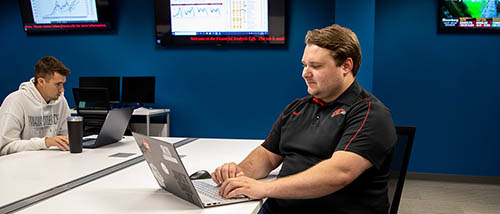Financial Econometrics
Continue to main content
Financial Econometrics Degree Map
Explore the courses you'll need to complete your degree.
Econometrics Degree Outcomes & Salaries
-
$116k
Financial Analyst
According to the Bureau of Labor Statistics, the median annual salary for a financial analyst is $116,490.
-
$103k
Financial Examiner
According to the Bureau of Labor Statistics, the median annual salary for a financial examiner is $103,650.
-
$180k
Financial Manager
According to the Bureau of Labor Statistics, the median annual salary for a financial manager is $180,470.
-
$115k
Economist
According to the Bureau of Labor Statistics, the median annual salary for an economist is $115,440.
Required Courses:
- AC221 Principles of Accounting I (3)
- CS101 Introduction to Computer Programming (3)
- EC225 Principles of Macroeconomics (3)
- MI101 Introduction to Computer Applications (3)
- EC410 Macroeconomic Theory (3)
- EC420 Microeconomic Theory (3)
- FI361 Financial Management (3)
- FI368 Investments (3)
- MA117 Pre-Calculus B (3)
- MA140 Analytic Geometry and Calculus I (5)
- MA145 Analytic Geometry and Calculus II (4)
- MA345 Linear Algebra (3)
- MA425 Applied Regression Analysis (3)
- MA575 Time Series and Forecasting (3)
Choose 3 hours:
- QM257 Business Statistics I (3)
- MA223 Elementary Probability and Statistics (3)
Choose 3 hours:
- QM258 Business Statistics II (3)
- MA323 Statistical Methods (3)
Choose 3 hours:
- EC351 Applied Economic Models (3)
- EC490 Business Forecasting (3)
Choose 12 hours:
- ECxxx EC prefix course at the 300-599 level (3 – 12 hours)
- FIxxx FI prefix course at the 300-599 level (3 – 12 hours)
- MA244 Analytic Geometry and Calculus III (3)
- MA375 Theory of Interest (3)
- MA385 Financial Mathematics (3)
- MA530 Statistical Learning (3)
Additional requirements (may fulfill general education requirements):
- EC215 Principles of Microeconomics (3)
- EN100 English Composition (3)
- EN140 Rhetoric and Critical Thinking (3)
- MA115/MA116/MA123 Mathematics (3)
- SC105 Fundamentals of Oral Communication (3)
- Social and Behavioral Sciences – 6 hours
- Constitution Requirement – 3 hours
- Written Communication – 6 hours
- Oral Communication – 3 hours
- Natural Sciences – 7 hours (from two disciplines, one to include a lab)
- Mathematics – 3 hours
- Humanities & Fine Arts – 9 hours (from at least two disciplines)
- Additional requirements – 5 hours (to include UI100 for nativestudents)
- Civics examination
First Year
Fall Semester (13 hours)
- UI100 (1)
- EN100 (3)
- MA116 or MA123 (3)
- MI101 (3)
- SC105 (3)
Spring Semester (15 hours)
- CS101 (3)
- EC215 (3)
- EN140 (3)
- MA117 (3)
- General Education (3)
Second Year
Fall Semester (17 hours)
- AC221 (3)
- EC225 (3)
- MA140 (5)
- QM257 or MA223 (3)
- General Education (3)
Spring Semester (16 hours)
- FI361 (3)
- MA145 (4)
- QM258 or MA323 (3)
- General Education (3)
- General Education (3)
Third Year
Fall Semester (15 hours)
- EC351 (3)
- EC420 (3)
- FI368 (3)
- MA345 (3)
- General Education (3)
Spring Semester (16 hours)
- EC410 (3)
- MA425 (3)
- Major Elective (3)
- General Education (3)
- General Education (4)
Fourth Year
Fall Semester (14 hours)
- MA575 (3)
- Major Elective (3)
- Major Elective (3)
- General Education (3)
- Elective (2)
Spring Semester (14 hours)
- Major Elective (3)
- Elective (3)
- Elective (3)
- Elective (3)
- Elective (2)
What will it cost?
Get Funding for Your Education
Missouri has opened the door to a more educated workforce. We want to help you walk through it. If you’re an adult learner returning to college, learn about the Fast Track Workforce Incentive Grant. It’s a statewide financial aid program that can be used to pursue a certificate, degree or industry-recognized credential in a high need area in Missouri. This major is eligible for the degree is a Fast Track grant.
Getting the Job
Your education is just one piece to launching an extraordinary career. Once you’ve mastered the material, you still have to find the job you want, make the right connections, and sell your knowledge and experience—if all this is giving you anxiety, don’t panic. SEMO’s Career Services office is here to help you with the next step. Our boldly supportive faculty will provide the expertise and support you need, so you’re landing your dream job in no time.
Become a Redhawk.
Do more than dream about the future. Take the first steps to make it all happen.
Accelerated Master’s Degree
SEMO offers an accelerated master’s degree for current students. You can get both undergraduate and graduate credit for some 500 level courses, meaning you can graduate with an MBA sooner.
Cape Girardeau, Missouri 63701
